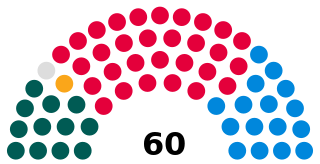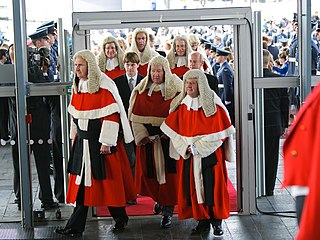
The legislatures of the United Kingdom are derived from a number of different sources. The Parliament of the United Kingdom is the supreme legislative body for the United Kingdom and the British overseas territories with Scotland, Wales and Northern Ireland each having their own devolved legislatures. Each of the three major jurisdictions of the United Kingdom has its own laws and legal system.

The United Kingdom has three distinctly different legal systems, each of which derives from a particular geographical area for a variety of historical reasons: English law, Scots law, Northern Ireland law, and, since 2007, calls for a fourth type, that of purely Welsh law as a result of Welsh devolution, with further calls for a Welsh justice system.

The Senedd, officially known as the Welsh Parliament in English and Senedd Cymru in Welsh, is the devolved, unicameral legislature of Wales. A democratically elected body, it makes laws for Wales, agrees to certain taxes, and scrutinises the Welsh Government. It is a bilingual institution, with both Welsh and English being the official languages of its business. From its creation in May 1999 until May 2020, the Senedd was officially known as the National Assembly for Wales and often simply called the Welsh Assembly.
The Courts of England and Wales, supported administratively by His Majesty's Courts and Tribunals Service, are the civil and criminal courts responsible for the administration of justice in England and Wales.

A legislative consent motion is a motion passed by either the Scottish Parliament, Senedd, or Northern Ireland Assembly, in which it consents that the Parliament of the United Kingdom may pass legislation on a devolved issue over which the devolved government has regular legislative authority.

The Welsh Government is the devolved government of Wales. The government consists of ministers and deputy ministers. It is led by the first minister, usually the leader of the largest party in the Senedd, who selects ministers and deputy ministers with the approval of the Senedd. The government is responsible for tabling policy in devolved areas for consideration by the Senedd and implementing policy that has been approved by it.

The chief justice of India is the highest-ranking officer of the Indian judiciary and the chief judge of the Supreme Court of India. The Constitution of India grants power to the president of India to appoint, as recommended by outgoing chief justice in consultation with other judges as envisaged in Article 124 (2) of the Constitution, the next chief justice, who will serve until they reach the age of sixty-five or are removed by the constitutional process of impeachment.

In the United Kingdom, devolved matters are the areas of public policy where the Parliament of the United Kingdom has devolved its legislative power to the national legislatures of Scotland, Wales and Northern Ireland, while reserved matters and excepted matters are the areas where the UK Parliament retains exclusive power to legislate.
There are four types of elections in Wales: elections to the House of Commons of the United Kingdom, elections to the devolved Senedd, local elections to community councils and the 22 principal areas, and the Police and Crime Commissioner elections. In addition there are by-elections for each aforementioned election. Elections are held on Election Day, which is conventionally a Thursday. Since the passing of the Fixed-term Parliaments Act 2011 for UK general elections, all four types of elections are held after fixed periods, though early elections to the UK parliament can occur in certain situations, with Senedd elections being postponed to avoid elections to the UK parliament and Senedd coinciding with each other.

Welsh law is an autonomous part of the English law system composed of legislation made by the Senedd. Wales is part of the legal jurisdiction of England and Wales, one of the three legal jurisdictions of the United Kingdom. However, due to devolution, the law in Wales is increasingly distinct from the law in England, since the Senedd, the devolved parliament of Wales, can legislate on non-reserved matters.

A Measure of the National Assembly for Wales is primary legislation in Wales that is a category lower than an Act of Parliament. In the case of contemporary Welsh law, the difference with Acts is that the competence to pass Measures is subject to 'LCOs' or Legislative Competence Order, which transfers powers to the Assembly by amending Schedule 5 of the Government of Wales Act 2006.

In the United Kingdom, a tribunal is a specialist court with jurisdiction over a certain area of civil law. They are generally designed to be more informal and accessible than 'traditional' courts.
In many countries, a statutory instrument is a form of delegated legislation.
Sir Gary Robert Hickinbottom is a British judge who currently serves as President of Welsh Tribunals and as Knight Principal of the Imperial Society of Knights Bachelor. In 2008, he became the fourth solicitor to be appointed a High Court judge, after Michael Sachs in 1993, Lawrence Collins in 2000, and Henry Hodge in 2004.

The Judges' Council is a body in England and Wales that, representing the judiciary, advises the Lord Chief Justice on judicial matters. It has its historical roots in the original Council of the Judges of the Supreme Court, created by the Judicature Act 1873 to oversee the new Supreme Court of Judicature. This body initially met regularly, reforming the procedure used by the circuit courts, and the new High Court of Justice but met less regularly as time went on, meeting only twice between 1900 and 1907, with a gap of ten years between meetings in 1940 and 1950 respectively. After relative inactivity, it was eventually wound up through the Supreme Court Act 1981, which contained no provisions for its continued existence, something Denis Dobson attributes to newer bodies which performed the duties the Council had originally been created to do.

The Upper Tribunal is a superior court of record and general tribunal in the United Kingdom.

The First-tier Tribunal is a first-instance general tribunal in the United Kingdom.

An Act of Senedd Cymru, or informally an Act of the Senedd, is primary legislation that can be made by the Senedd under part 4 of the Government of Wales Act 2006. Prior to 6 May 2020 any legislation was formally known as an Act of the National Assembly for Wales or informally, an Act of the Assembly.

Sir Wyn Lewis Williams is a Welsh judge who served as President of Welsh Tribunals from 2017 to 2023. He had been a High Court judge from 2007 to 2017.

The Wales Act 2017 is an Act of the Parliament of the United Kingdom. It sets out amendments to the Government of Wales Act 2006 and devolves further powers to Wales. The legislation is based on the proposals of the St David's Day Command Paper.









